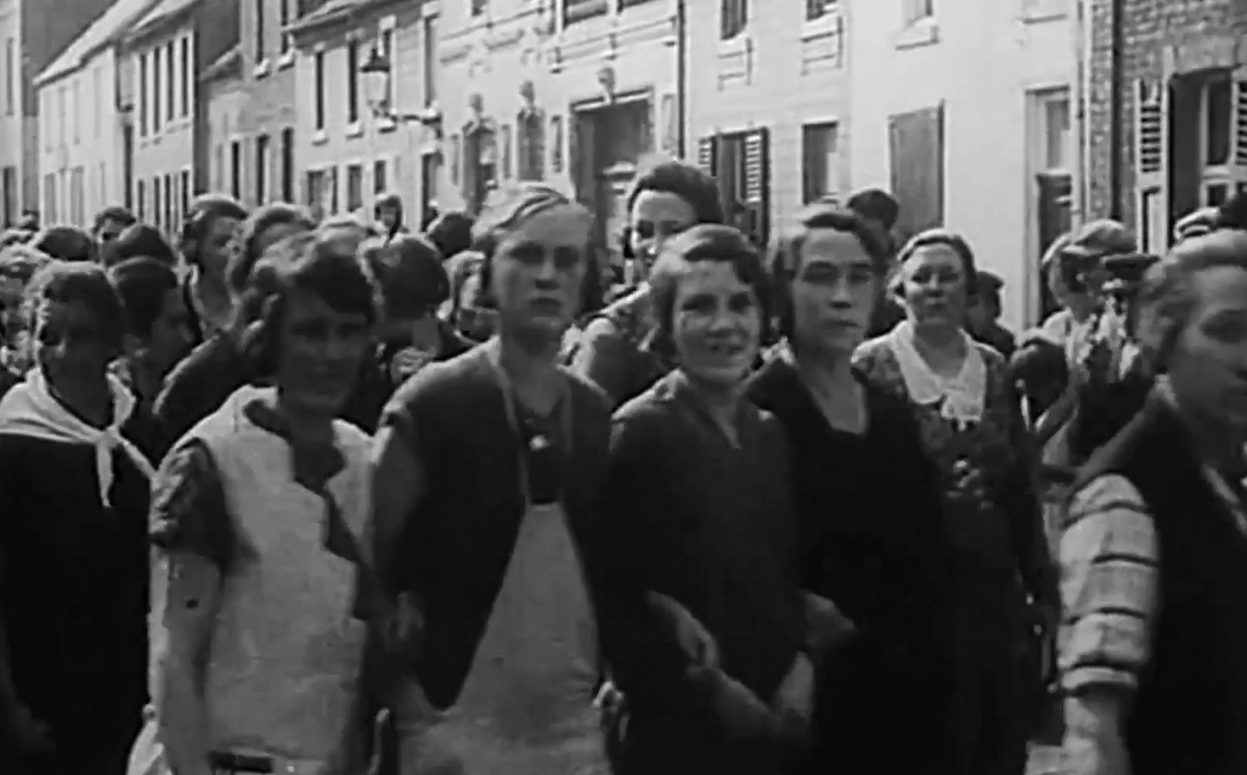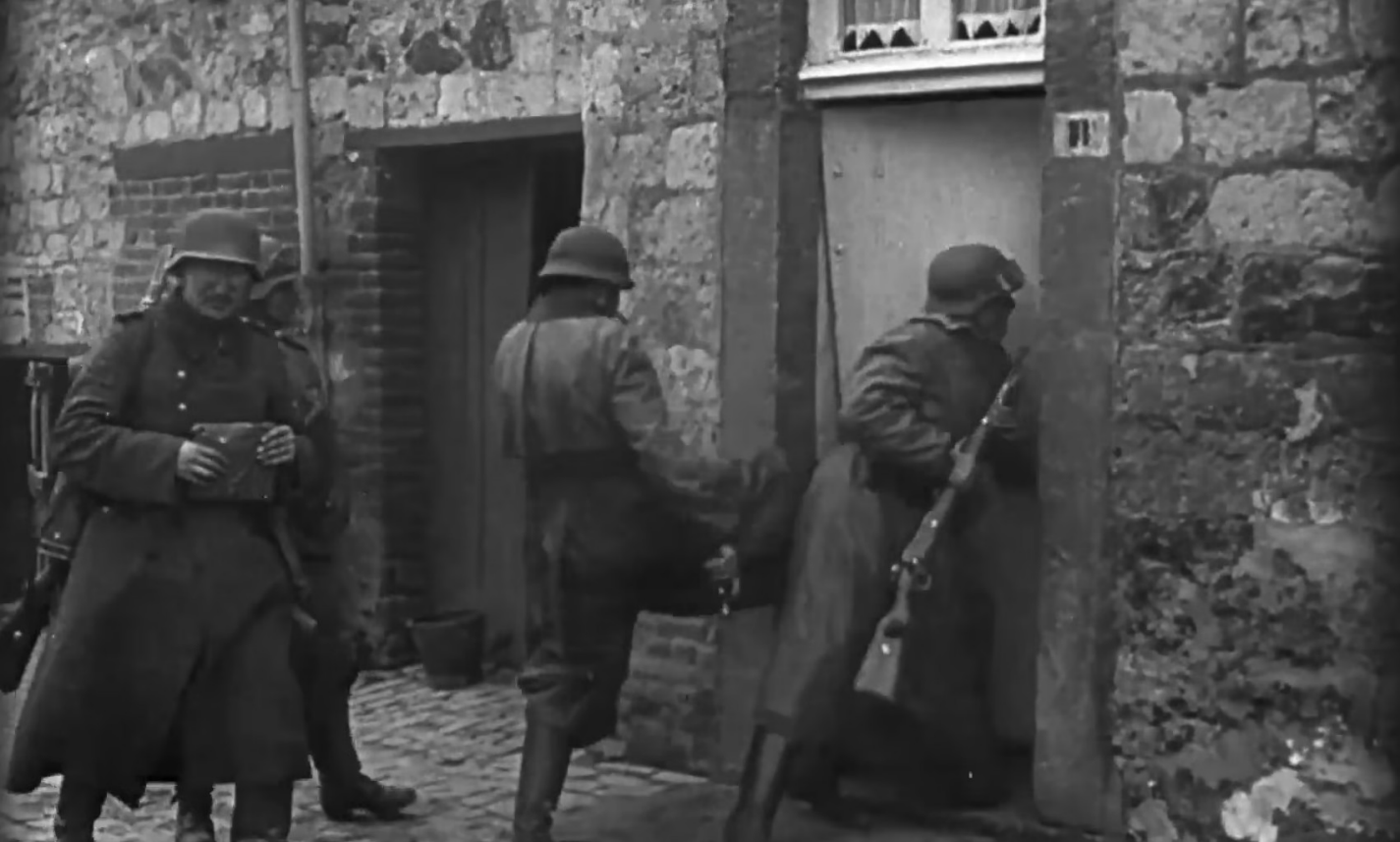Quoting Steve Cushion in On Strike Against the Nazis, pages 13–7:
In April, instead of the promised issue of 15kg of potatoes for workers in heavy industry, they only received half that amount, while the rest of the population only got 2kg. So, on 18 April 1941, a Communist militant, Suzanne Grégoire, led a demonstration against food shortages.18 Then, on 7 May it was announced that there would be no more potatoes for anyone. So, on 9 May at 6am, the miners of Boverie des Charbonnages at Marihaye, refused to go down the pit.
On Saturday 10 May, the first anniversary of the [Fascist] invasion, the women from the foundry at Cockerill, the largest metalworking plant in Liège, toured the rest of the site convincing the other workers to stop work; 8,000 workers went on strike.
By the time the engineers of Cockerill had started their strike, more than 6,000 miners were already out on strike. From Monday 12 May, the strike covered the whole Liège mining region. On the 13th, 20,000 miners and 11,000 engineers supported the action, the 14th 31,000 strikers, the next day 51,000, the 16th 54,000 and the 17th 33,000 engineers and 27,000 miners.19
[…]
The underground newspaper of the PCB, Le Drapeau rouge, sheds a light on the active rôle of women in the strike.
The edition of May 1941 reads:
Strikes: despite the threats the strike movement grows
Since the 10 May, important strikes have been taking place in Belgium, generally around the same demands: increased provision of fresh food, wage increases and against tax increases. And these strikes have been accompanied by protests and demonstrations by women in a number of industrial towns.
During the strike, the women of the area around Mons have actively supported the industrial struggle. 400 women demonstrated at Paturages demanding more food supplies. […] Last week, several strikes broke out in the engineering and textile industries in Ghent. […] During these strikes, the women of the town demonstrated with their children to demand better food provision, the same as their sisters around Mons. These demonstrations were successful in obtaining a supply of potatoes.
Women Demonstrate in LiègeA special edition of June 1941 says:
Women demonstrate for food.
For the last month, a large number of delegations of women have been demanding that the authorities increase food provision, as well as frequently calling for the return of the prisoners of war. Every time, the authorities have promised to meet these demands, but never did so. Exasperated by this increasingly desperate situation, working class women have moved to more militant action. Above all demanding potatoes, an increased bread ration, meat, milk for children and old people, the women have begun to organise mass demonstrations against the authorities, in the streets and in the markets where they are demanding price reductions.
Repression
Hitler himself ordered an immediate food distribution to bring an end to a movement that was costing 2,000 tons of lost steel production every day. He could not afford to lose this in the run up to the invasion of the USSR.23
Operation SonnenwendeA month later, on 22 June, Operation Barbarossa was launched and, at the same time, Operation Sonnenwende started the severe repression of the French and Belgian Communists. In Belgium, 1,800 left‐wing militants were arrested by the occupying forces with the help of the Belgian police. Julien Lahaut was arrested and sent to a concentration camp in [the Third Reich.]24
On 22 September 1941, 60 miners who had been arrested for their rôle in the strike were deported from the prison in the citadel of Huy to the Neuengamme concentration camp. Only twenty‐four […] returned alive.25
The strikes of May 1941 in Belgium started as an economic struggle over food rations. Working class women led the campaign for increased food rations and the support from family members was crucial in sustaining the strike. Women workers in the engineering industry were also instrumental in initiating the mass action.
The strong tradition of shop steward organisation in the Liège region provided leadership that was not restrained by a trade union bureaucracy that had either abdicated responsibility or were actively collaborating. Communist shop stewards led the action, but they in turn were influenced by the rank and file response and this, in turn fed back into the party leadership.
The strike gave a new impetus to the underground trade union movement and led the Communists to modify their tactics, giving increased emphasis to the Comités de Lutte Syndicale (CLS).
José Gotovitch writes:
The big strike by Belgian miners and metalworkers in May 1941 marks the reconnection of the party with social reality. Its rôle as catalyst and organiser of the movement allowed it to supplant the old trade union delegates in numerous southern Belgian French‐speaking workplaces.26
As we shall see, a similar dynamic would operate in Northern France.
(Emphasis original.)
Click here for events that happened today (March 13).
1882: Fanni Luukkonen, Axis collaborator, was born in Oulu, Pohjois‐Pohjanmaa, Finland.
1932: A presidential election took place in Germany; Adolf Schicklgruber received 30.1% of votes while Paul von Hindenburg received 49.6%. Since no one received 50% of votes, a second election would be required.
1933: Joseph Goebbels became the Third Reich’s Minister of Public Enlightenment and Propaganda, a cabinet‐level position.
1936: The Third Reich’s head of state spoke publicly at Karlsruhe.
1938: Imperial aircraft bombed Nanzheng Airfield in Shaanxi Province, and Horst Böhme murdered Wilhelm Freiherr von Ketteler in Vienna, Austria by drowning on the orders of Reinhard Heydrich. Austrian Chancellor Arthur Seyß‐Inquart claimed that Austrian President Wilhelm Miklas had resigned his post and consolidated the power of the president in the position of the chancellor; in actuality, Miklas had refused to resign. Meanwhile, Kurt Schuschnigg’s small Fatherland’s Front (a Fascist political party created in 1934 from the Christian Social Party, which had advocated Austrian independence along Italian Fascist lines) disbanded; the Party leaders were either arrested by the German Fascists or fled into exile. Later, Schicklgruber visited his parents’ graves, then visited his hometown of Braunau and then returned to Linz to give a speech.
1939: The Reich’s head of state once again demanded that Jozef Tiso declare Slovakian independence from Czechoslovakia; meanwhile, Reich Foreign Minister Joachim von Ribbentrop presented him reports of Hungarian troop movements on its border, hinting that the Kingdom of Hungary, friendly to the Reich, was ready to strike should the negotiations in Berlin fail. Coincidentally, the Gestapo raided the offices of the patriotic Pan‐German League throughout the Reich. A number of its leaders came under arrest, their offices sealed and the League compelled to close.
1940: Joachim von Ribbentrop informed the Italian Fascists that Berlin would like to push the date of the upcoming Brenner Pass meeting with Benito Mussolini on or about March 18, 1940.
1941: Berlin repeated demands for the Kingdom of Yugoslavia to officially join the Axis. Likewise, 236 Axis bombers attacked Glasgow and Clydeside, Scotland for the first time, targeting munitions factories and docks, sinking three cargo ships and damaging two destroyers. To the south, Axis bombers assaulted Liverpool for the twoth night in a row, pushing total casualty to about five hundred. Berlin appointed Alfred Rosenberg the minister of the eastern occupied territories, while further conquests would be assigned to Heinrich Himmler. Hermann Göring took the responsibility of exploiting the resources in conquered Soviet territory. Erwin Rommel also moved his headquarter to Sirte, Libya.
1942: The Axis transferred 1,200 sick prisoners (judged as unable to recover) from the hospital within Auschwitz I camp to the BIb sector of Birkenau camp, where the Axis exterminated them, then it transported their bodies back to Auschwitz I for cremation. In Poland, the Belzec concentration camp opened for operation with a transport of 6,000 Jews from Mielec.



